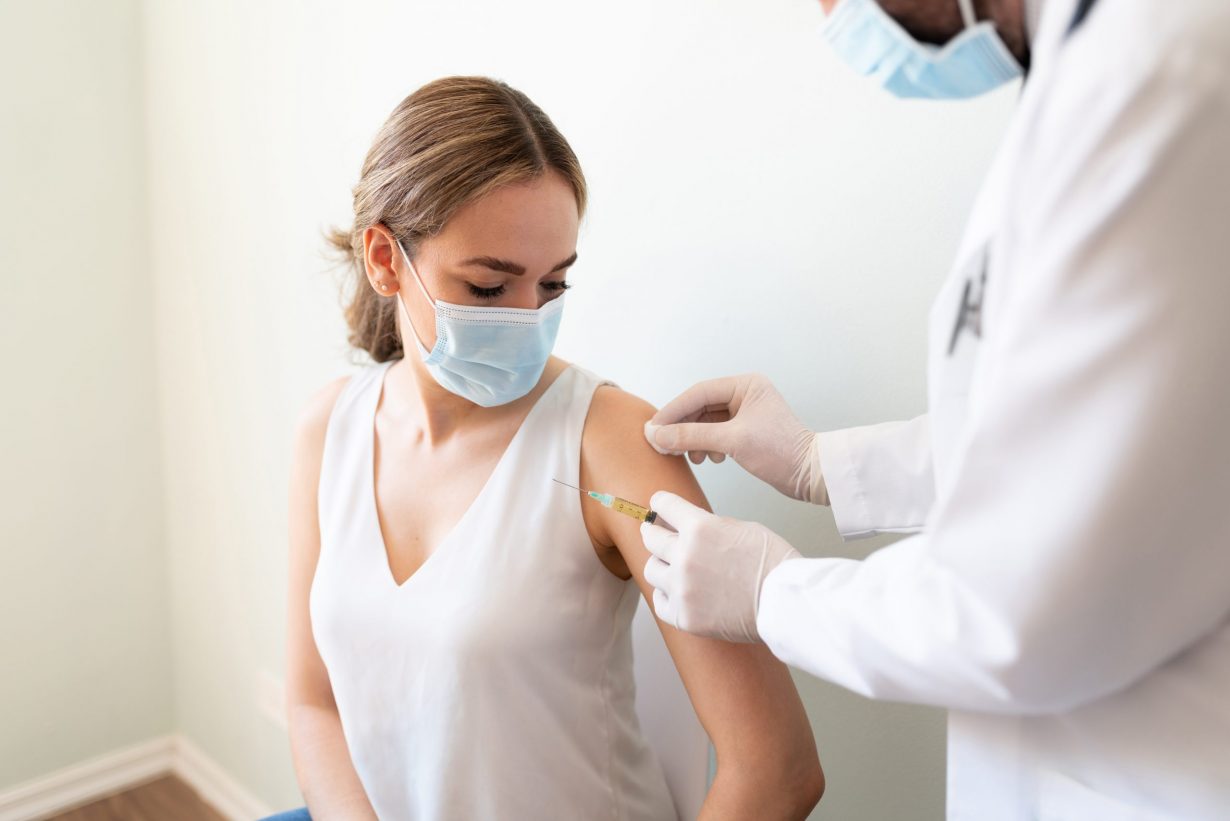LISTEN TO THIS ARTICLE:
Lots of Questions
Right now, the United States can fully vaccinate every eligible citizen against COVID-19. All the challenges of production, supply, distribution, transport, and storage of the vaccines and personnel and facilities to administer it are solved. Vaccinating everyone would essentially end the pandemic and permit a complete return to normal life for all of us. Yet only about 50% of the population has chosen to get the vaccine, and the deadly pandemic rages on. Why are so many hesitant to get the vaccine while others jumped at the chance?
These vaccines were developed too fast. How can they be safe?
We live in a tense time in America right now, beset by division, mistrust, confusion, and uncertainty about many issues, not just the vaccine. Vaccine hesitancy is nothing new. No doubt it has been around for as long as vaccines themselves. However, our current social and political climate has fueled mistrust and brought this already complicated issue to a fever pitch.
Human Nature
Illness, pain, suffering, death, and loss of loved ones are deeply personal, highly emotional matters. While we humans like to think of ourselves as intelligent and rational, we often make choices based on emotions. Like it or not, our passions cloud our judgment.
For most people, once we believe something in our hearts, facts and explanations presented in the most rational ways will not change our view. Once we own a belief, particularly about an emotional matter, we tend to be biased and see any new information through that lens.
Social beings
As if that wasn’t enough, our humanity gives us another layer of complication. We are social beings, and we all have a deep need to belong to a group. Cooperation between individuals has served us well throughout our history, and loyalty to our particular “tribe,” who share our same beliefs and values, is a powerful influence.
On top of it all, we have ready access to more information from more sources than ever before in history. The “tribes” we choose to belong to have taken new forms and can include people we don’t even know or have never met (think social media).
Three Sides to Every Story
Lots of ideas are floating around out there about vaccines, from fundamental concerns about side effects, “will I get sick from it?,” to conspiracy theories about it altering our DNA or turning us into submissive automatons.
On the other side, there is no shortage of people who are quick to criticize those who resist the vaccine. They may blame them for the resurgence, call them foolish, or even crazy. Emotions are high all around, and this serves only to make people dig their heels in deeper.
Meanwhile, the virus just keeps mindlessly doing its thing, replicating, mutating, spreading, sickening, and killing people, without regard for which “tribe” you may belong to.
Call Me Crazy, But…
Instead of criticizing those who disagree with our stance, it would be immensely more helpful to try and understand their perspective. Consider that underneath what sound like “crazy” beliefs may be unbearable fears.
The idea that a virus you cannot see and might not even know you have, can potentially cut your life short is terrifying. The concept of an out-of-control pandemic killing millions of people is horrifying.
Sometimes our minds try to cope with overwhelming emotions like these by using defenses like denial. Convincing oneself that there are alternative explanations and that this is not actually happening is much easier emotionally than facing the horror.
On the Fence
Let me be clear, I am not expecting to change anyone’s mind with facts. But maybe you are on the fence and are looking for some answers. Consider the following:
“I don’t believe in science.”
Science is neither a religion nor a belief system. Science is a systematic method of studying something and accumulating knowledge. The scientific method tests a hypothesis to either prove or disprove it by controlling variables and observing measurable results. Investigators then share their results with others who review and critique their methods. The results must be able to be replicated before they are accepted as part of the cumulative knowledge base.
We humans have progressed so dramatically over the last 150-200 years because of science. Things we take for granted, roads, bridges, trains, airplanes, automobiles, complex buildings, and so much more, all became possible because of what we’ve learned through science.
Satellites, GPS systems, the smartphone or computer you are reading this on right now, all exist because of science. Sophisticated weapon systems, autonomous drones, CT and MRI scanners, medical treatments, surgical techniques…we could go on and on. All owe their existence to science.
“But science changes its mind.”
In the natural world, things are constantly changing. This is true for biological systems and just about everything in the universe. At the same time, our techniques for observation and measure continue to advance. The more knowledge we accumulate, the more questions arise and more study is needed.
So, no science does not change its mind. Science does not have a mind. When the situation changes, recommendations based on what is learned through science are revised. Otherwise, we would never make progress.
“These vaccines were developed too fast. How can they be safe?”
Think about all the things we live with today that seemed impossible just a short time ago. Every year Apple releases a new iteration of the iPhone. These “phones” are, in fact, tiny supercomputers we carry in our pockets. They connect us to a worldwide network of people and information about anything we can think of in an instant. A couple of weeks ago, Amazon CEO Jeff Bezos and others were launched into space and landed safely back on the ground. The rocket boosters that took them up gently landed back on earth, standing upright on specific sites, ready to be reused. It was all autonomous with no pilots. Doctors perform surgery using robots through tiny incisions. We can hold live meetings of 20 (or more) people in all different parts of the world with real-time video and sound.
Just a short time ago, these things were the stuff of science fiction. None of them came about overnight. The technologies evolved and developed over many years and many incremental advances.
The same is true for making vaccines. The fact that we can have a vaccine for a novel virus in such a short time is a fantastic achievement for humankind. It is something we should applaud. The technology used to develop the vaccines didn’t come about overnight. It is the result of decades of research and development.
The first smallpox “vaccine” was an experiment by a farmer in England in 1774, who scratched some pus from cowpox lesions on a cow’s udders into the skin of his family members. We’ve come a very long way.
“What if I get sick from the vaccine?”
Vaccines activate our immune systems. That’s precisely how they work. Our bodies’ defenses kick in when they see an invader. They produce antibodies (proteins that stick to the intruder) and killer cells that find those invaders and destroy them. This inflammatory response makes us feel sick.
When we have an actual infection, the invader keeps replicating, and our bodies need to be in an all-out war with it. But when we get a vaccine, once the immune system has done the work of making the markers it needs, it calms down, and the symptoms go away. We may get a fever, headache, chills, or other symptoms that tell us the vaccine is working. While unpleasant, they generally only last from a few hours to a couple of days. Over-the-counter pain relievers or fever reducers can help to lessen the symptoms. All of this seems well worth it for the protection you gain against getting sick with or spreading COVID-19.
“I am young and healthy, and I’m not worried about COVID.”
We are facing a deadly virus that replicates and stealthily spreads from one person to many very fast. We must step back and realize we are in this together, and the virus is our common enemy. It helps to think in terms of our part in the context of all humankind. Whether or not you get seriously ill from COVID-19, you could pose a danger to others. All of us, including you, will suffer the longer this pandemic rages on. Until we can stop it, our lifestyles, mobility, economy, and nearly every aspect of life cannot entirely go back to normal. More importantly, the virus will continue to mutate, and we cannot know what the next variant might be capable of doing.
Regardless of your political leanings, we all must think of the big picture. This is not about politics. Some politicians have exploited the situation for their personal gain by making it a political issue, but it is certainly not. Biology doesn’t have politics. A virus does not have a point of view. It exists only to replicate itself and use another living thing as a host to propagate itself.
In conclusion, I urge you to take some time to reflect. See if you can turn off all the noise, remove the emotion from this issue, and get to the bottom of what is driving your choice.
In dialectical behavior therapy (DBT), there is a model called “wise mind.” It goes like this: there is the emotional mind, where emotions drive our thoughts, actions, and behaviors. There is the rational mind, where rational thought and careful decision-making based on facts is in charge. Finally, there is the “wise mind,” where the two intersect and overlap. When we use our “wise mind,” we recognize and acknowledge our emotions and we employ our reason in the most constructive way. We bring the two together to make the best decisions for ourselves and the greater good.

 Learn
Learn Read Stories
Read Stories Get News
Get News Find Help
Find Help
 Share
Share
 Share
Share
 Share
Share
 Share
Share



